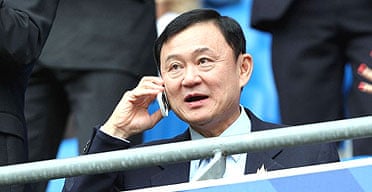Senior Thai judges issued arrest warrants for the ousted prime minister Thaksin Shinawatra and his wife yesterday on the grounds that they sought to evade corruption charges over a multimillion-pound land deal.
The former leader, who recently acquired Manchester City football club for £81.6m, was deposed in a bloodless coup in September while he was abroad. He has since been living in exile in London and failed to appear before a hearing scheduled to begin yesterday.
The nine-judge panel of Thailand's supreme court ordered the telecoms billionaire and his wife, Pojaman, to be produced before the court at the next hearing scheduled for September 25. Prosecutors said afterwards that if Mr Thaksin failed to appear by the new deadline then extradition proceedings would be considered.
However, an extradition request to British authorities would have virtually no hope of success. British law has no charge equivalent to that which Mr Thaksin, 57, is facing under Thai legislation. Foreign governments are also usually reluctant to extradite former heads of state where there are suspicions of political persecution.
The couple are accused of being involved in a £11.1m land deal to buy a prime piece of Bangkok real estate in 2003 while Mr Thaksin was prime minister, in contravention of laws barring serving officials and politicians engaging in business with state enterprises.
In the wake of the coup, an "assets examination committee" established by the military-appointed government investigated the purchase of land from an arm of the Bank of Thailand at an auction in which other bidders dropped out.
If convicted, Mr Thaksin faces up to 10 years in jail. The committee is demanding the purchase be set aside, the land returned and the money confiscated.
The former prime minister's lawyer, Pichit Cheunban, argued that because of the political uncertainty in Thailand it was not safe for his client to return, though his wife has travelled in and out of the country often and is currently in London.
The lawyer argued that Mr Thaksin's reappearance in Thailand would merely destabilise the fragile political situation ahead of elections that the coup leaders have pledged by December.
He added that it would be impossible for Mr Thaksin to receive a fair trial while the junta was still in control and urged that the case be postponed until next year, or until at least a month after the elections.
"I have talked with my two clients and we agree that the best timing for them to return to fight the case is after the election," Mr Pichit said after the ruling. "We reiterate that the current situation is still not good for their safety and we have no desire to see disunity in the country."
In his initial reaction to the Thai court's decision, Mr Thaksin gave a non-committal response to the Associated Press.
"I am aware of the decision in Thailand," he said in a statement. "I shall consult with my legal advisers and make an announcement in due course."
The army chief, Sonthi Boonyaratglin, who led the coup, said Mr Thaksin's safety would be guaranteed if he returned, directly contradicting an earlier statement that the former premier might be at risk from his enemies.
"The [National Security Council] has to be responsible and the government has to ask the police to take care of it with the military playing a supporting role," he said. "There should not be any problem for him to return. Everything has gone in accordance with the Assets Examination Committee and court process."
Since June, almost £1bn of Mr Thaksin's assets have been frozen in Thai bank accounts. The tycoon was already a wealthy businessman before he secured two terms in office between 2001 and 2006. But the tax-free sale of his telecoms empire to the Singapore government's investment arm in 2006 sparked mass street protests that led to his eventual downfall.
The Thai military, which justified its takeover on the grounds that Mr Thaksin was corrupt, vilified the former prime minister, but took almost eight months to bring the first charges against him.
Backstory
Football-mad Thaksin Shinawatra became the first prime minister in Thai history to win two terms of office. The ex-policeman, born in the northern city of Chiang Mai, studied in the US and holds a PhD in criminal justice. On his return in the 1980s, he set up a telecom business and carved out a huge empire, helped by cornering state monopolies. He burst on to the political stage in 1998, using his millions to form the Thai Rak Thai party and in three years he was prime minister, championing Thailand's rural poor, who still revere him. Before purchasing Manchester City, he failed to win control of Liverpool FC while still prime minister after it emerged that he planned to use state funds to bankroll the deal.
